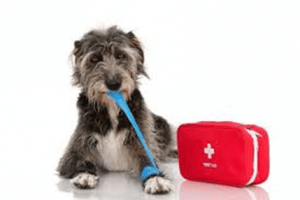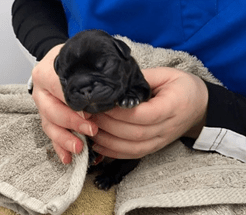Emergency Visits
Here at Fox Veterinary Clinic we offer out of hours emergency assistance. We operate from two emergency locations; one is our clinic in Finglas and the second location in the Pet Emergency Hospital (PEH) located at the veterinary college in UCD.

If you are looking for out of hour (OOH) assistance please call the clinic and follow the voice message instructions. This will include the number to call for the out of hours vet. The vet will triage your pet over the phone and advise you on the next step.
Depending on the emergency you may be seen in our clinic in Finglas. However, if the vet feels your pet needs an extensive work up (such as x-rays, certain tests or surgery) outside of our opening hours you may be referred to the PEH. Our emergency will also endeavour to do what they can for your pet in time of their time of need as their health and care is always top priority.
The PEH provides out of hours care for over 50 practices in Dublin and surrounding areas. Any patients who are seen at the PEH will have all the necessary tests done with clinical histories and results sent to us the very next morning.
Please visit their website for more information https://petemergencyhospital.ie/.
UCD Veterinary Hospital,
University College Dublin,
Dublin 4.
Types of Emergencies
An emergency is classified as something that has an immediate threat to your pet’s life with significant impact on their health and welfare. These are situations are likely to deteriorate if left unmanaged and require assistance as soon as possible.
Below is a list and a brief explanation of some emergencies. Should you find yourself in any of these situations please call us immediately and follow the advice given.
Some Common Examples Include:
Difficulty Breathing or Choking:
Choking is usually as a result of a pet attempting to swallow a small toy, ball or other small object.
Clinical Signs Include:
- Excessive pawing at the mouth
- Difficulty breathing with choking sounds when coughing/breathing
- Blue/grey gum colour (their gum colour should a pink salmon colour)
In cases with any breathing difficulties try keep them as calm as possible and avoid any unnecessary stress. Laboured breathing or breathing more than usual should not be ignored particularly in patients with any heart or lung issues. This includes trying to refrain from panicking while you are on your way to us. Your pet will pick up on this so it is vital to remain calm for their benefit.
 Severe Bleeding:
Severe Bleeding:
If your pet has a severe (external) bleed or a bleed that does not stop within 5 minutes you should:
- Apply direct pressure to the area using a clean cloth or gauze
- If the blood seeps through the first compress layer apply a clean layer behind the first one
- Do not move the first layer as this will disrupt any blood clots that have formed, you should check the wound every 3 minutes not every few seconds
- Apply pressure above and below the wound. This will help control the bleeding from the arteries and veins
- For injuries to the extremities use these measures along with gently elevating the leg until the wound is above your pet’s heart. This will cause gravity to reduce the blood pressure near the wound. This works best with large dogs with long legs
Internal Bleeding:
This can be much harder to detect as it is a bleed that is happening within the body. Signs that you should look out for include:
- Your pet’s gums will be very pale
- Weak and rapid pulse
- Your pet may be very subdued or collapsed
- Their extremities will be cold to touch
Ensure you keep your pet as warm and comfortable as possible while on traveling to seek medical assistance.
Road Traffic Accidents, Dog Fights/Attacks and Other Trauma:
If your pet is a casualty of any of these traumatic events, they are usually in a shock from what just occurred. The signs of shock include:
- Weak but rapid pulse
- Pale gum colour
- Low temperature
- Shallow breathing
- Nervousness
- Dazed eyes
While on your way to seek medical help, we would recommend you keep your pet stabilised to prevent any further injuries. For smaller pets you can place them in a box with blankets. Ensure they are kept warm, quiet and calm. Control any bleeding with the measures explained previously and follow the advice of the vet.
 Seizures:
Seizures:
Seizures can have a multiple of causes which range from neurological to toxins. It is important to time your pet’s seizures. If your pet has a succession of seizures one after another or has a seizure that lasts more than 5 minutes or does not stop at all you should seek veterinary advice immediately.
What To Do If Your Pet Has A Seizure:
- Do not try restrain your pet but ensure the environment around them is safe. Move any furniture that may cause them injury
- Time the seizure (they usually last between 2-3 minutes)
- Turn all lights off and keep the room as dark as possible
- Turn all radios, Televisions etc off and keep as quiet as possible
- Do not move or stimulate your pet
- Once the seizure stops keep calm, quiet and warm
- Follow the advice of the vet
Other emergencies That Require Immediate Veterinary Attention Include:
- Difficulty giving birth- More than a few hours between kittens/puppies
- Bloat/Distended abdomen- Gastric dilatation and volvulus-GDV is a condition in large breed dogs where the stomach fills with gas and twists applying pressure on the diaphragm. It requires immediate veterinary assistance and can be fatal if left untreated
- Injuries to your pet’s eye
- Ingestion of toxins- If possible, have the name of the toxin your pet ingested along with how much and how long ago it was eaten
- Inability to pass stool- This can often be sign of a foreign body blockage somewhere in the gastrointestinal tract usually caused by your pet eating something they should not have. This along with vomiting or inability to keep down water usually indicates there may be a foreign body present
If you are concerned about your pet and require immediate medical assistance contact the clinic immediately on 01 8348411 and we will assist you.
